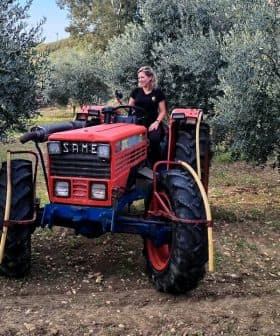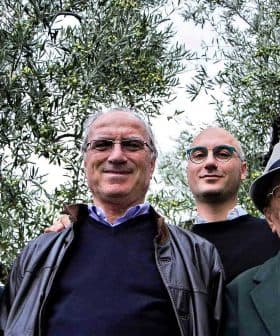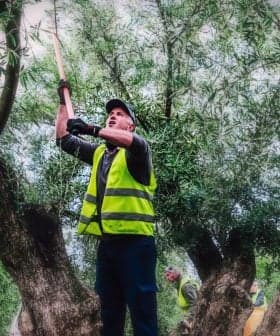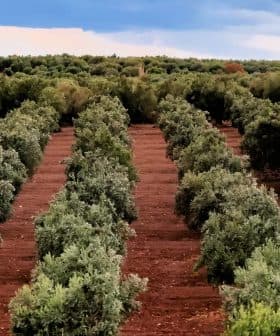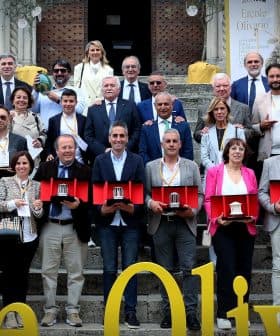Scientists Pool Expertise in Fight Against Fake Olive Oils
Experts from around the world gathered at the Workshop on Olive Oil Authentication in Madrid to discuss the prevalence of olive oil fraud and potential solutions, including the use of near-infrared spectroscopy and DNA markers. The workshop highlighted the need for faster, more robust testing methods, as current methods are not sufficient to detect all types of fraud, as evidenced by high non-compliance rates in Spain and Canada.
 Experts from around the world attended the Workshop on Olive Oil Authentication. See the list of participants here.
Experts from around the world attended the Workshop on Olive Oil Authentication. See the list of participants here.
More than twenty of the world’s experts on olive oil verification met earlier this year, and a recent summary of their brainstorming provides an illuminating update on olive oil fraud and possible solutions.
Easy to adulterate while still staying within the European olive oil standard.
That there is a problem was not in dispute. Figures released at the Workshop on Olive Oil Authentication, held in Madrid June 10 – 11, show that one in four olive oils sampled in Spain, and nearly one in three in Canada, failed recent official fraud tests.
A newsletter on the workshop — released this week by joint hosts the European Commission and the International Olive Council (IOC) — states at the outset that solutions have yet to be found for three problems in particular: the blending of extra virgin olive oil or virgin olive oil with soft deodorized olive oil, or with other adulterant oils, and the evaluation of quality parameters related to freshness.
Scientific knowledge of olive oil chemistry and technology “lags behind the inventiveness of certain operators,” it says.
And in a separate document with presentations from the workshop, Christian Gertz, of the German Society for Fat Science (DGF), said it is currently “easy” to adulterate with low-grade olive oils or foreign oils while still staying within the physical and chemical property limits of the European olive oil standard.
Possible solutions: (NIR) spectroscopy and DNA markers
The workshop evaluated current methods for monitoring olive oil authenticity as well as alternatives that could help meet the need for tests that are “faster, cheaper, more robust and accepted worldwide.”
Among the many state-of-the-art options discussed was near-infrared (NIR) spectroscopy, a “quick, easy, cheap” method Gertz predicted would become, “a dominant analytical tool for routine and real-time food safety and quality controls.”
The attractiveness of DNA-based methods was also discussed, particularly regarding the detection of the adulteration of virgin olive oil with other vegetable oils, and also the potential for an “identity card” for premium olive oils.
“The complete sequence of the olive genome that will be shortly available will provide genomic information for developing more efficient DNA markers,” the newsletter said.
Pigments and other possible parameters
Australian Oils Research’s Rodney Mailer told the workshop that two new methods of fraud detection, DAGs (diacylglycerols) and PPPs (which measures degradation of olive oil’s chlorophyll pigment to pyropheophytin), have shown considerable promise in determining oils which are old, have been poorly stored or possibly refined. Some organizations have resisted investigation of these methods “despite the evidence,” he said.
But Lanfranco Conte, from Italy’s University of Udine, discussing the challenges of detecting adulteration with soft deodorized olive oils, said that DAGs and PPPs had limitations in this area as both are strongly influenced by storage time and conditions.
However, summing up the experts’ views during later discussions on research on olive oil pigments — mainly chlorophyll and carotenoids — the newsletter said that despite their sensitivity to light, temperature or oil ageing, these had various strong points which should be taken into account.
“Participants highlighted the needs of reference materials for chlorophyll a and β‑carotene and of support from the IOC and JRC (European Commission Joint Research Centre) to coordinate ring tests for method validations.The objectives could be reached within a nearly three years period of research.”

Complementing the panel test
Chemical tests don’t inform about aroma or taste, hence the need for the panel test, but the workshop heard that the steady increase in olive oil consumption requires an increased number of well-trained sensory panels, “which are costly to maintain.”
New devices (such as electronic noses and tongues) and analytical methods (such as dynamic head-space and solid phase micro extraction analysis) capable of using the same compounds — volatiles — as human sensors could “lessen the work of sensory panels”.
Challenges and recommendations
The workshop participants also identified various obstacles to progress in the fight against fake olive oils. These include poor knowledge of the deodorization processes used in the industry and lack of access to representative samples of soft deodorized olive oil, such as to help train sensory panels.
Among other measures, they suggested creating an industrial plant to produce a range of samples of soft deodorized oils.
Regarding current standards, participants said “existing limits for FFAs (free fatty acids) and UV (ultra-violet) should be reduced and total amounts of erythrodiol and uvaol should be calculated instead of a percentage of total sterols,” the newsletter also said.
Official fraud test results in Spain
Juan Ramón Izquierdo, from the Spanish Ministry of Agriculture, Food and the Environment’s olive oil tasting panel, and Angela Sheridan, from the Canadian Food and Inspection Agency, shared results of olive oil verification tests in their respective countries.
There were 770 inspections in Spain in 2012 and a 23 percent non-compliancy rate, according to Izquierdo, who said nearly half of the violations of applicable standards related to quality and purity.
“Those regarding quality are basically related to the organoleptic quality of virgin olive oils. Basically they consist of packing lower quality oils as extra virgin oils.” But lampante oils were also found, he said.
Nearly a third of the violations related to product labeling, four percent to traceability, and the rest involved other breaches.
As for the labeling breaches, these were mainly due to misuse of the legal definitions in EU regulation 29/2012 on marketing standards for olive oil, particularly the need to include on products of the “olive oil” category the sentence: “oil comprising exclusively olive oils that have undergone refining and oils obtained directly from olives.”
According to Izquierdo, this sentence “is not used by the packer on many occasions.”
He said that while the methods required by current EU regulations are sufficient for detecting the more common frauds in olive oil purity, there are “other types of fraud, including the use of deodorized oils, for which the current methodology seems to be insufficient.”
Canada: adulteration on rise again
Meanwhile, nearly a third of all olive oil samples tested in 2012/13 by the Canadian Food and Inspection Agency were found unsatisfactory. Those rated unsatisfactory have a high certainty of adulteration, according to Sheridan’s workshop presentation.
Common adulterants found were vegetable oil (canola, sunflower and soybean oils), refined olive oil, and olive pomace oil.
Nearly half of all samples tested in 2006/07 rated unsatisfactory. The percent of non-compliant samples then fell steady, reaching 11 percent in 2009/10, but rose to just over 30 percent in 2010/11 and again in 2012/13.
Since 2007, fines totaling $250,000 (US$242,000) have been issued and oil worth $500,000 (US$485,000) ordered destroyed.
Horizon 2020 research project planned
The priority areas identified in the workshop are now being used to prepare a call for a research project on olive oil authentication set to be included in the European Union’s Horizon 2020 research program due to be launched by late 2013/early 2014.
Access the workshop presentations, posters, list of participants, and newsletter here.


